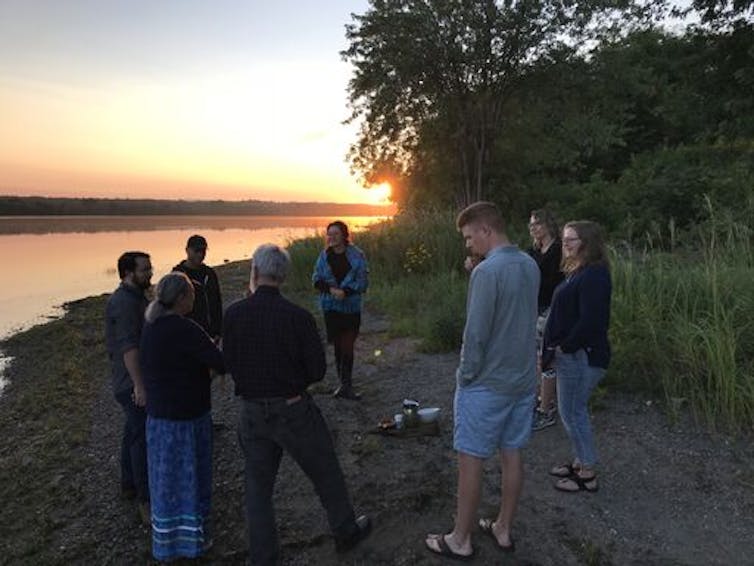Heather Castleden, Queen’s University, Ontario
The federal government recently announced a $20 million initiative to reduce diesel dependency in up to 15 remote Indigenous communities. At first glance, the program seems like an exciting opportunity for these communities to achieve stable, reliable and affordable clean energy on their own terms.
About 250 remote communities are not connected to Canada’s electricity grid and rely on local, diesel-powered generators to produce electricity. But diesel delivery is expensive and unreliable (due in large part to weather), which translates to high costs for consumers. It is also a dirty fossil fuel that contributes to climate change, the defining challenge of our time.
Addressing climate change in Indigenous contexts requires leadership from Indigenous peoples, communities, organizations and governments. But more often than not, Indigenous knowledge-holders are ignored, dismissed and even undermined by governments in the development of national policies.
As a collaborative team of Indigenous and settler researchers studying reconciliation in the context of renewable energy through a program called “A SHARED Future” — we had questions about this initiative, and we’ve been able to ask them.
We have a rare opportunity to look inside this federal initiative during the development stage to evaluate what’s working (and what’s not) and provide real-time feedback to the federal public servants rolling it out. Our participatory action research has sought to inform the design, and will continue to track the initiative over the next three years. Our aim is to show how future federal initiatives could reflect Indigenous leadership from concept to implementation.
The backstory
Our research is currently guided by an Indigenous research advisory committee (Ken Paul from the Maliseet First Nation/Wolastoqwey Neqotkuk in New Brunswick, Diana Lewis from the Sipekne’katik First Nation in Nova Scotia, and Melissa Quesnelle Naatoi’Ihkpiakii from the Kainai First Nation in southern Alberta), and we will seek additional members from the 15 communities eventually selected for funding.

Heather Castleden/A SHARED Future, Author provided
The foundation of our research lies in reconciliation between Indigenous and western knowledge systems. For example, we want to know what reconciliation looks like in the context of local-to-global demands for energy, and how we can work to repair historical energy injustices. We are also committed to examining Indigenous perspectives on any culturally relevant gender issues and impacts surrounding this initiative, as even the clean energy sector has inequities.
Help versus support?
In its announcement, the government noted that it wants to “help” and partner with Indigenous communities to build a cleaner energy future. We delve into whether this is an Indigenous-led initiative soliciting help, or simply another government-led program seeking validation.
In the context of Indigenous rights, sovereignty and self-determination, it’s important to know who designed the initiative, how it evolved, to what extent the eligibility criteria reflect Indigenous ways of knowing and expertise, and how the jury was selected to adjudicate the applications.
Perhaps most important, does this initiative truly reflect a nation-to-nation relationship in the spirit of truth, healing, reconciliation and calls to action?
Championing Indigenous-led clean energy
From coast to coast to coast, Indigenous communities in Canada are quickly becoming important leaders in the renewable energy sector.
First Nations, Inuit and Métis peoples are involved in, or own, more than 150 large-scale clean energy projects. Many are developing renewable energy programs to break free of colonial ties, move towards energy autonomy, establish more reliable energy systems and secure long-term financial benefits. The right kind of projects may help with broader calls for reconciliation and nation-to-nation building in this country.

Simon Brascoupé, Author provided
We also know that governments have a “consistent pattern of failures in public-sector policy and project implementation.” Indeed, the western science community continues to have difficulty working with Indigenous knowledge-holders and valuing their knowledge systems in relation to other environmental issues such as water policy and management.
Read more:
Alberta’s shameful pipeline politics ignores First Nations
But there is strong evidence that Indigenous-led and Indigenous-created programs, whether government-supported or research-based, have a better chance of success when “helpers” get out of the driver’s seat.
New opportunities or same old, same old?
The announcement speaks of working together, partnership, collaboration and self-determination. But it does not use the language of reconciliation or rights, show that Indigenous peoples are driving the agenda or indicate to what extent the team behind the initiative strove to do things differently.
From the first phase of our participant-observation research, we know, for example, that the initiative originally targeted all remote diesel-dependent communities, and that it will now only include remote Indigenous diesel-dependent communities.
This is certainly a step in the right direction — as it could begin to mend energy inequities — and it’s the outcome of an unusually long period of engagement and the interventions of Indigenous clean energy champions, our research team and others.
Read more:
Law professor put on trial for ‘trespassing’ on family’s ancestral lands
The Truth and Reconciliation Commission calls for action and accountability through transparency. Our analysis will look at how to make the processes behind this initiative fully transparent. For example, what went into NRCan’s decision to engage with the two not-for-profit collaborators, the Pembina Institute and the Indigenous Clean Energy Social Enterprise (ICE SE)?
This research matters within the federal discourse of nation-to-nation relations because our future is uncertain, not just in terms of real reconciliation, but also in terms of the urgency needed to respond to the climate crisis.
As researchers, it’s important for us to understand how federal programs like this one can address the climate crisis and advance reconciliation. The right to self-determination — “nothing about us, without us” — is key to our analysis.
The ribbon-cutting ceremony is over
For the next phase, we’ll interview participating Indigenous community members, public servants, utilities, developers and not-for-profits involved in the development and roll-out of the Indigenous Off-Diesel Initiative. We want to understand the challenges and successes encountered in implementing clean energy projects, to what extent this work reflects a commitment to reconciliation and to what degree iterative feedback from our team and Indigenous community members is taken up, given this country’s colonial and bureaucratic structures.
The Government of Canada has expressed a clear desire to do things differently; it wants “innovative solutions to economic, environmental and social problems.” The funding for this initiative falls under the terms and conditions of Impact Canada, led by the Privy Council Office. Naturally, the Privy Council Office is watching the roll-out of this experiment that highlights partnership and collaboration with Indigenous clean-energy champions … and so are we.
Derek Kornelsen of Rootstalk Resources contributed to this article.![]()
Heather Castleden, Canada Research Chair in Reconciling Research for Health, Environments, and Communities and Associate Professor (Department of Geography and Planning and Department of Public Health Sciences), Queen’s University, Ontario
This article is republished from The Conversation under a Creative Commons license. Read the original article.

